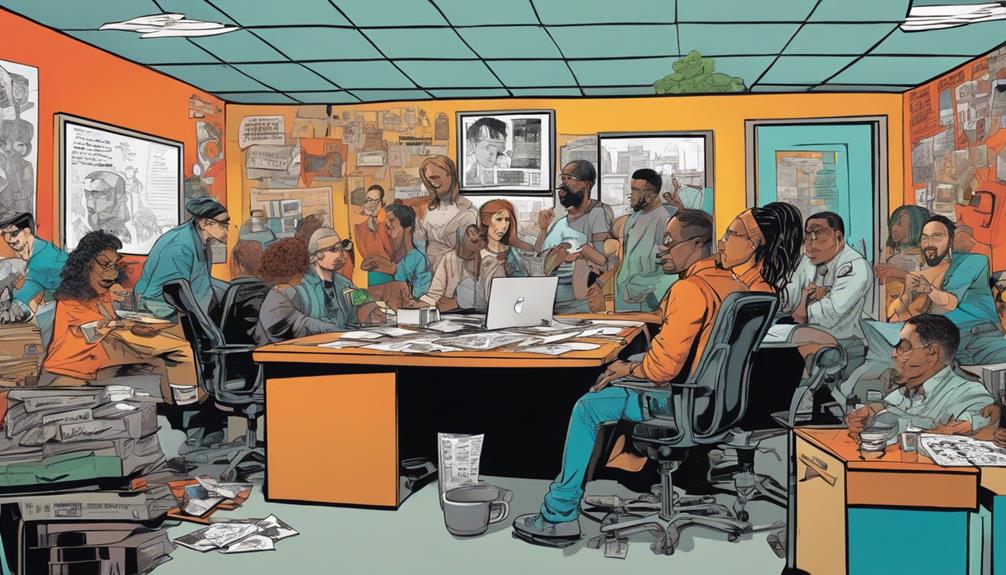Transforming your office talk with prison slang can spice up communication and build bonds among colleagues. Terms like "ear hustling" can describe gossip, while calling a reliable teammate your "road dawg" fosters trust. You can even identify a new intern as a "cowboy" to lighten the mood. Using these expressions not only makes interactions enjoyable but can also enhance clarity and openness. By integrating this slang, you'll navigate office dynamics and strengthen relationships effortlessly. If you're curious about how these terms can shift workplace culture, there's much more to explore.
Key Takeaways
- Use terms like 'Road Dawg' and 'Cellies' to foster camaraderie and strengthen workplace relationships.
- Encourage direct feedback instead of dry snitching, promoting open communication for better teamwork.
- Recognize and respect 'OGs' to enhance trust and acknowledge valuable experience within the office.
- Observe workplace dynamics and engage with colleagues to adapt quickly and build rapport.
Understanding Prison Slang
Understanding prison slang can unfasten insights into workplace dynamics, revealing how certain terms reflect the behaviors and relationships that shape your office environment.
For instance, when you hear 'Buck Rogers Time,' it captures that feeling of endless workdays. You might encounter a 'Cowboy,' the inexperienced intern who tests everyone's patience.
Then there's 'Ear Hustling,' a reminder of that gossipy co-worker who can disrupt your focus. 'Dry Snitching' highlights the subtle art of informing on others without direct confrontation, adding a layer of complexity to office politics.
Recognizing these terms helps you navigate the underlying tensions and camaraderie in your team, enabling you to foster a more supportive and productive work atmosphere.
Enhancing Workplace Communication

Effective workplace communication hinges on clarity and mutual respect, transforming interactions into productive collaborations. When you embrace straightforward language and listen actively, you create an environment where everyone feels valued. Here's a quick reference table for enhancing your communication:
| Slang Term | Meaning | Workplace Equivalent |
|---|---|---|
| Buck Rogers Time | Unrealistic timelines | Avoid setting impossible deadlines |
| Cowboy | Inexperienced employee | Mentor new team members |
| Ear Hustling | Eavesdropping | Foster open communication |
| Dry Snitching | Indirectly informing on others | Encourage direct feedback |
Building Stronger Relationships

Building stronger relationships at work starts with genuine communication and a willingness to support one another. By embracing prison slang, you can break down barriers and connect with your colleagues in unexpected ways. Use terms like “Road Dawg” to show loyalty or refer to your “Cellie” to emphasize shared experiences. These phrases create a sense of camaraderie and understanding.
Encourage open discussions and be mindful of how you listen—avoid “Ear Hustling” and respect others' privacy. Recognizing your coworkers as “OGs” can also foster respect for their experience.
When you build a supportive environment, trust naturally follows, and your team will thrive. Remember, strong relationships lead to better collaboration and a more enjoyable workplace.
Navigating Trust Issues

Trust issues can undermine the supportive relationships you've fostered in the workplace, making it essential to address them head-on.
You need to recognize when colleagues are acting like 'bug' or 'wolf tickets.' If someone's consistently unreliable or makes promises they don't keep, it's time to reassess your trust in them.
Instead of dry snitching or ear hustling, communicate openly about your concerns. Building trust requires transparency and accountability.
Foster relationships with your road dawg or OG, who can help bridge the gap when tensions rise.
Remember, a solid foundation of trust enhances teamwork, boosts morale, and ultimately leads to a more efficient work environment.
Don't let trust issues fester; tackle them directly for a healthier workplace.
Adapting to New Environments

As you step into a new workplace, embracing the challenges of being the 'fresh fish' can set the tone for your success and growth. You'll need to adapt quickly to your surroundings and build rapport with your colleagues.
Here are three strategies to help you navigate this change:
- Observe the Culture: Take time to understand workplace dynamics, including communication styles and social norms. This will help you blend in seamlessly.
- Engage with Colleagues: Don't hesitate to introduce yourself and strike up conversations. Building relationships will provide you with support as you acclimate.
- Seek Feedback: Regularly ask for input on your performance. This shows your willingness to learn and grow, helping you establish credibility in your new role.
Recognizing Power Dynamics

Understanding the power dynamics in your workplace is essential, as it helps you navigate relationships and align your strategies for success.
Recognize who holds the keys—those influential figures who can impact your career trajectory. Be aware of the house mice, your supervisors, and how they interact with staff.
Notice the OGs, the seasoned employees whose experience can guide you. Pay attention to how different personalities clash or cooperate; a road dawg can be invaluable for support.
Identify any cowboy behavior; inexperienced colleagues can disrupt harmony. Finally, be cautious of dry snitching and ear hustling, as gossip can undermine trust.
Leveraging Networking Opportunities

Networking opportunities can greatly enhance your career prospects, so it's crucial to actively seek out and engage with influential peers and mentors.
One effective way to leverage these connections is by adopting a strategic approach:
- Attend industry events: Make it a point to participate in conferences, workshops, or local meetups where you can meet key players in your field.
- Utilize social media: Platforms like LinkedIn allow you to connect with professionals, share insights, and stay updated on industry trends.
- Follow up: After meeting someone, send a brief message to express your appreciation and reinforce the connection, paving the way for future conversations.
Transforming Office Culture

Transforming office culture starts with fostering open communication and building trust among team members. You can encourage transparency by sharing feedback regularly and addressing issues directly, avoiding dry snitching behaviors.
Create an environment where everyone feels safe to express their ideas, much like a supportive road dawg, ready to back each other up. Recognize the contributions of long-standing staff, the OGs, to build respect and loyalty.
Embrace newcomers, the fresh fish, helping them adapt and feel included. Finally, steer clear of wolf tickets; guarantee promises are backed up with action.
Can Using Prison Slang in the Office Have Negative Consequences?
Using prison slang in the office, whether it’s business casual vs smart casual, can have negative consequences on the overall workplace environment. It can lead to misunderstandings, miscommunication, and even create a hostile or unprofessional atmosphere. It’s important to maintain professional language and etiquette to foster a positive work environment.
Conclusion
By embracing prison slang in your office, you can create a vibrant atmosphere that's as invigorating as a cool breeze on a sweltering day.
This playful language not only lightens the mood but also strengthens bonds among colleagues.
As you weave these terms into your daily interactions, you'll find that communication flows more freely, fostering a sense of unity and understanding.
So go ahead, break the ice and watch your workplace transform into a more engaging and connected environment.









